The Romanian state never runs lab tests for the disinfectants used in hospitals. Manufacturing recipes of the biggest producer show that the antiseptics are diluted!
Published at Monday, 25 April 2016, 06:04
The newspaper reveals to the public two production documents of Hexi Pharma, a company that delivers disinfectants to over 300 hospitals in 40 counties across Romania.
UPDATE: In a press release, Hexi Pharma stated they are considering suing the newspaper. Good for them. The company further states that the format of the recipe is an outdated one. This is precisely what the source stated and that is clearly mentioned in the article. It is a recipe the production man took from the factory a few years ago. You will find the press release in full at the end of the article.
UPDATE: This morning, at Realitatea TV, after Dorin Chioțea showed him the first page of the newspaper, the minister of health, Cadariu-Achimaș, stated: ”I speak in good faith, I didn’t know that the Romanian state wasn’t running lab tests for the hospital disinfectants! That is precisely why it is so important that the ministry launches tomorrow the program against nosocomial infections. We have to start somewhere”.
Investigation by Mirela Neag, Răzvan Luțac, Cătălin Tolontan and Alex Nicodim (photo)
- The victims from "Colectiv" died and millions of Romanians are treated in hospitals disinfected with substances for which the state never runs laboratory tests.
- Not even when the state grants them the trade license.
- "We only compare the label with the permit", states, astonishingly enough, the Public Health Department (DSP)!
- That even if Gazeta found out, right from the official reports of the Public Health Department, that the sanitary authorities discovered "a lower concentration than the one on the label" for some of the antiseptics.
- The newspaper discloses internal documents from the factory of Hexi Pharma, the market leader and the company that owns contracts with over 300 hospitals from 40 counties, indicating how disinfectants are produced with a lower concentration than the one on the label.
- These are the exact substances that the Public Health Department discovered.
- After being contacted, the company has not denied up to this moment the authenticity of the manufacturing recipes the newspaper holds.
- "The signature looks indeed like mine. If I signed, I do not know what I signed, I know Chemistry as much as you do! We have initiated an internal investigation", says the Hexi Pharma general manager, who is a biochemist.
- These biocides are used everywhere in the hospitals: surgeons use them to wash their hands, the operating tables are cleaned with them, the scalpels are sterilized with them and they are used as well to clean every room in the hospital, from wards to intensive care.
- And isn’t it ironic: the sales of the company have doubled after the tragedy from Colectiv.
- “Mr. Condrea, something is wrong in our distribution chain network!”
- “Close the door, please.”
The man, Dan Alexandru Condrea, is the owner of Hexi Pharma, the biggest disinfectant producer in Romania.
The company supplies more than 350 hospitals from 40 counties. The Hexi Pharma antiseptics are used, according to their own presentation, "in over 2,000 operating rooms".
They should fight precisely against the series of killer bacteria that were discovered in the bodies of the dead from "Colectiv".

The man in front of the owner, a specialist in the production of disinfectants, stormed into Condrea’s office, directly from the factory’s production hall. He recalls every single idea from that discussion.
There were not too many ideas anyway.
"The concentration for Thor, Suprasept and other disinfectants we deliver to hospitals is not ok. Take a look at the recipes we are given, please! The recipes do not match the labels! It’s simple maths. The resulting concentration is much too low compared to the one written on the labels", I told him, the source recalls.
"Condrea replied in a flat voice that it is none of my business. That’s his almighty style in front of the employees. He once told me that my job was to produce substances and not to ask questions".
The specialist went three times to open the owner’s office door. And every time he closed the door behind him.
Every time with the same outcome
796
Public procurement contracts have been appointed to Hexi Pharma for the last 9 years for hospitals, military bases, penitentiaries and others
Medical Director of a hospital: "Have you snatched from the disinfectant?!"
The doctor scrubs his hands before operation.
He is the medical director of a hospital in Bucharest. And a surgeon at the same time. He absentmindedly and thoroughly scrubs his hands. At a certain point, he sets off swearing heavily.
"Where are you?!!!". The nurses make their appearance, rolling their eyes like lemurs.
"What have you done with this crap of a substance? Have you watered it down?". The women knit brows with half played annoyance.
- “Come on, doctor…”
- “Don’t come on me! A few days ago, the disinfectant was ok. Today I feel it doesn’t clean at all, it’s like washing myself with water and soap!”
The nurses lose their temper as well. The director acts rather shitty, with his suspicion they “snatched" from the antiseptics. They change their tone, from "doctor" to "director".
- “You know what, director, we open right now a brand-new container!”
- “Yes, please, do it now!”
The three nurses open a container of disinfectant produced by Hexi Pharma. The doctor notices the same substance with a weird, diluted consistency. The nurses watch him closely, waiting for an excuse.
"I am sorry, you are not the ones to blame, you haven’t diluted anything, that’s how the substance is", he says and closes the door.
The doctor-patient meeting
A few months later.
"Where do you work?", The doctor asks the patient.
"At Hexi Pharma, we produce disinfectants for hospitals". "And what do you do there?". "I am in charge of the production".
The surgeon gives a bitter smile.
The door opens and the room takes them both in.
"And what is your advice for me? I am also a medical director here. Should we keep on buying from you?". The patient shakes his head.
The surgeon and the person he is about to operate on in a few days leave together. The door closes and they talk about many things. More than anyone could imagine.
He took documents from the company
The production man brought two sheets of paper to his boss, Dan Alexandru Condrea.
And, because the boss sent him back to the factory, "with no further comments", the highly qualified employee left the company after a while, he took several documents with him and chose to make public two of them. Right about now.
How the active ingredients are being diluted
The documents include the recipe glossary taken directly from the factory and also signed by Flori Dinu, who is the general manager Hexi Pharma and a biochemist.
Thor and Suprasept are produced according to these formulations, two antiseptic substances commonly used in the Romanian hospitals.
5%
is the actual concentration of the active ingredient Didecyldimethylammonium in THOR, instead of 15% as specified on the label
1.25%
is the actual concentration of the active ingredient Glutaraldehyde in SUPRASEPT, instead of 12% as specified on the label
1.6%
is the actual concentration of the active ingredient Didecyldimethylammonium chloride in SUPRASEPT, instead of 7% on the label
"Multe din loturi se produceau așa. Cei de la firmă se vor apăra spunînd că nu toate. Nu toate, aproape toate!", spune sursa.
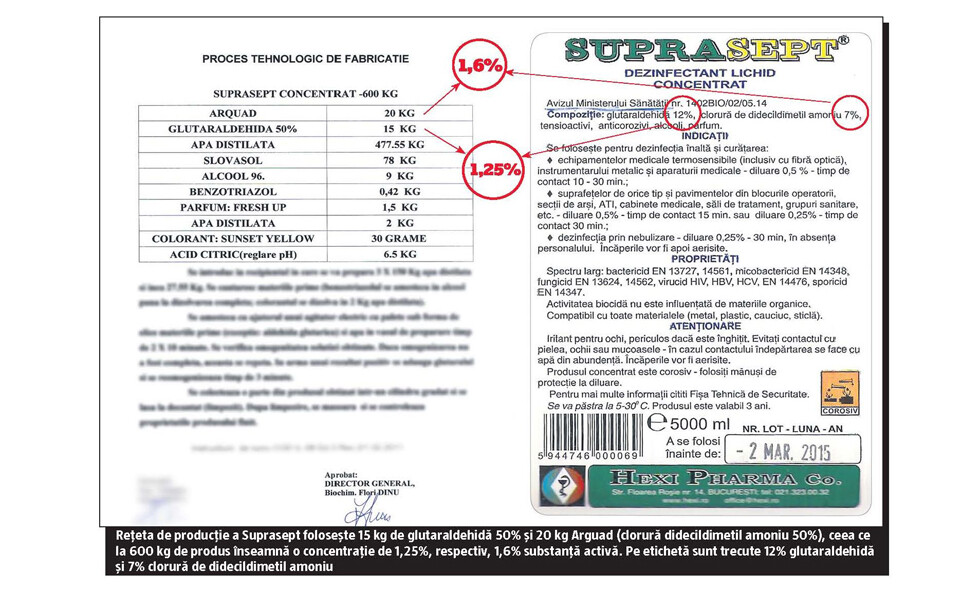
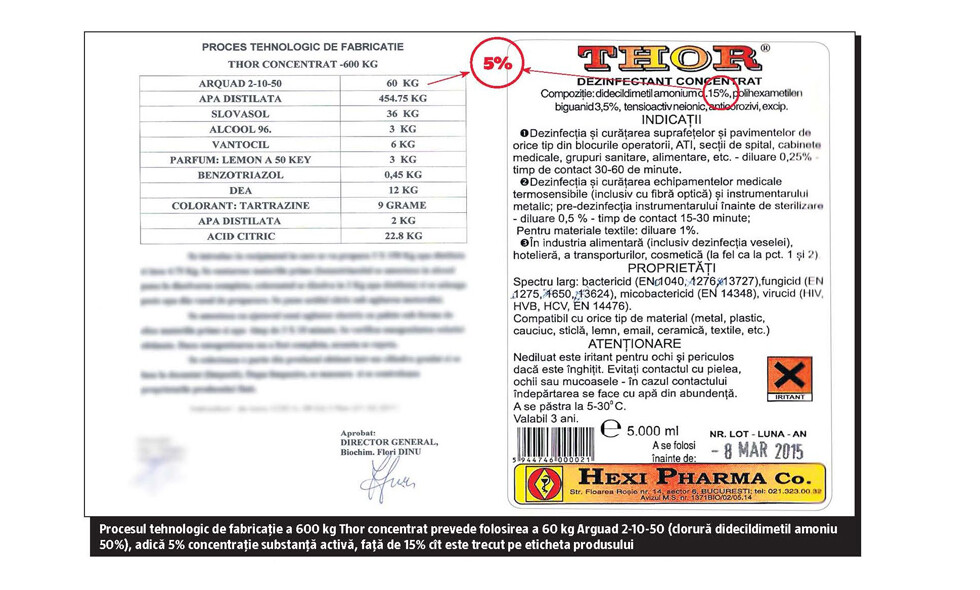
The remorse of the production man
But, before the documents were revealed, 64 people got burnt at "Colectiv".
Immediately after Gazeta published, in December 2015, the article about the nosocomial infections that killed most of the people admitted in hospital, the Hexi employee contacted us.
"I can tell you one of the reasons for which those people are dead. It is one of the causes no one talks about", the specialist said five months ago.
He had the documents, he had taken them from the factory.
He seemed distressed and, although he didn’t say it out loud, his eyes carried the remorse of not speaking up earlier.
And he was also somehow scared. Nobody can anticipate the way things unfold once they are set into motion
From 3 times
up to 9 times lower was the concentration for the production of the disinfectant, according to the recipes presented by the source
What the second source has to say
It took us several months until we got the second confirmation. Another former employee of Hexi Pharma decided to speak up "without disclosing my name for the moment".
"Yes, some of the batches of disinfectants are soapy water, so to speak"THE SECOND SOURCE OF GAZETA
The man worked precisely in the distribution department, in relation with the hospitals and the sanitary control authorities.
"Because the production was done according to other recipes than the standard ones, there were always problems. The hospitals would figure it out. Sometimes thousands of containers with Hexi Pharma products were withdrawn from the market", states the former employee.
"There were compliance issues in many counties and at many hospitals: Arad, Sibiu, Tg. Mureș, Argeș, Slatina... but in the end, they were all covered up", he further adds.
The surprise within the official reports
The statement of the second source regarding the recurrent issues, are mentioned in the Annual Activity Reports for 2013 and 2014 of the Public Health Department (DSP) in Bucharest.
Several Hexi Pharma products are mentioned as "having compliance issues".
The used term is utterly legal and vague.
But occasionally someone gets out of line.
”For the THOR product, the spraying solution concentration is lower than the one in the license” THE PUBLIC HEALTH DEPARTMENT ANNUAL REPORT FOR 2014

What they discovered and how they covered it up
Through Address 165618 from October 28, 2014, the Ministry of Health requested a field investigation for "biocide substances".
There are signals from many hospitals regarding malfunctions with several companies, not only Hexi Pharma. The results arrive.
There are several manufacturers with products that are “not compliant”. G&M 2000 SRL, one of the biggest companies on the market, is listed with four “not compliant” products.
Six of the Hexi Pharma products fall short and get the "not compliant" appraisal.
The complaints related to the disinfectants, no matter the manufacturing company, are diverse and abstract.
But somebody slams the door.
The ministry receives from the local Public Health Department a notification regarding issues with THOR, a rapid-acting disinfectant, used for hands but also for medical instruments.
What did the local Public Health Department find? "Compliance issues: the label lacks the non-toxic mention, the concentration of the spraying solution is lower than the one in the license, the contact time for the surfaces within medical facilities is lower than the one stipulated in the license".
The Ministry of Health demands the Public Health Department in Bucharest to take the necessary measures.
And the Health Authority replies that “the biocide product was re-labelled according to the stipulations of the Regulatory Document no. 528/2012".
That’s it? Yes, that was all.
"The meetings for the recipes’ prescription were secret"
The third source of the newspaper, also a former Hexi Pharma employee, claims "I was not in charge with production, I was not aware what was going on".
The man held an important position, but in the infrastructure department, not in the factory.
"I was not granted access to the recipes, the meetings for the prescription of recipes were secret. Owner Condrea and general manager Flori Dinu were the ones taking part on a regular basis to those meetings. I do not know anything about that!", the source points out. The other sources say: "Come on, of course he also knew!".
All the ones speaking up today knew.
Hypocrisy? If we rule out the hypocrisy from the world’s dynamics we will be listening to a symphony without violins. The motivations of the sources are not obvious, sometimes they must be guessed.
Documents, not words
It is a history that is hard to believe and also difficult to digest. A story that hurts you physically while you read it.
"Several producers apply the same method. Their products vary a lot in quality from one batch to another", tell doctors from many hospitals. Just words.
But is the story of the diluted biocide substances based only on words?
No, it is on paper. On a lot of paper!
A. In the annual official report of the Public Health Department in 2014: "The concentration of the spraying solution for THOR is lower than the one stipulated in the license".
B. In the internal documents of Hexi Pharma, which show how THOR is manufactured with a concentration lower than the one in the license and the one on the label.
The statements from the two sets of documents are reinforcing each other and leave us wondering: how was that possible?
How was it possible, the most important producer in Romania dilutes the concentration, then “concentration” issues surface in the official reports, while all this time the international studies indicate we have the most antibiotic resilient bacteria across Europe and yet not even a single health authority department undergoes a more detailed investigation?
Not only chemical tests for the Hexi Pharma products, because it’s not about just one company, we’re talking about all of them.
The authorities do not run any lab tests
As a matter of fact, things are even worse than they seem.
The Romanian state has not lab tested over all these years the composition of any of these disinfectants!
How do we know that? It’s a fact. An undeniable reality depicted in the written documents and in the authorities’ statements.
The hospitals in Romania clean their rooms every single day, the doctors in Romania scrub their hands for every operation and the medical instruments are being sterilized with substances the medical authorities do not run chemical tests for, in a laboratory. They do not carry out random checks.
And you know what else? They do not even check the ones they identify as "not compliant".
The state does not supervise any producer
Some hospitals run another type of test, but not a laboratory one. They do the "sanitation test", meaning they measure if after the use of a certain substance there are still microbes left on the disinfected hands or surfaces. These are the same type of reports that indicate some counties have zero infections, as shown by an article in Viața Medicală (Medical Life).
”Unfortunately, the hospitals’ reports regarding the bacteria infections are deceiving. They lied before Colectiv, they keep on lying now! Soon an official report of the Ministry of Health will come out, proving it!” - SOURCE FROM THE MINISTRY OF HEALTH
They control the products by comparing two documents!
During the last months, the newspaper has engaged in intensive correspondence and face-to-face talks with the Public Health Departments in Bucharest and all over the country, with hospitals and many institutions that are in charge with public health in Romania.
We kindly asked them to explain how could the notice “the concentration for the spraying solution is lower than the one stipulated in the license", included in the official report of the Public Health Department in Bucharest for 2014, lead only to the "label change" and to no other further investigation.
"What do you mean we haven’t controlled? We controlled THOR", said Alina Popescu, the head of the control office from the Public Health Department (DSP) in Bucharest. How did they do that?
”How did we control THOR? We checked the compliance between the label and the license” - ALINA POPESCU, HEAD OF THE CONTROL OFFICE OF DSP BUCHAREST
The official position of DSP
The no. 1 authority in public health further added: "The product itself (THOR) was not identified as non compliant regarding the concentration, we identified a discrepancy between the label and the initially presented license". Admirable. But how do you know the product does not have failures in compliance?
For the question:
"How do you know the product is compliant and it is only a discrepancy in the label? Have you lab tested the concentration?"
The answer was:
"The control actions from 2014 and 2015 did not focus on doing laboratory chemical determinations".
So they did not run any test. They compared two papers. That is what they mean by control.
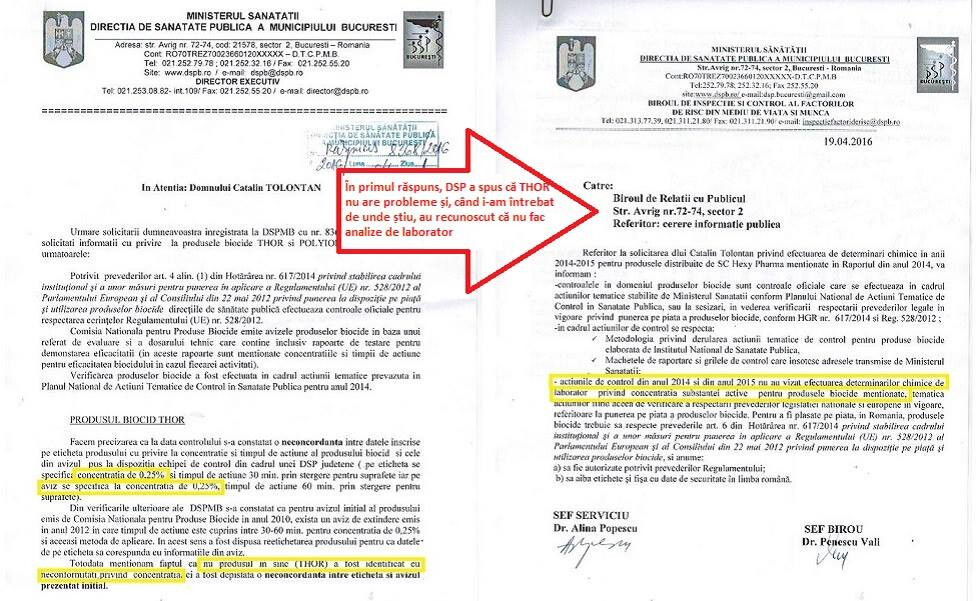
In reality, the DSP heads know the facts
Dialogue with one of the local DSP managers.
The director is aware of the situation but does not want his name to be made public.
“Regarding the biocide issues, the reports indicate several non compliant substances.”
“Yes, some of them were clearly specified. Others…”
“What about others?
“We know about others, but no one wrote them down, because they were not lab tested.”
“And how do you know about them?
“From the hospitals, from the effect they have there, from everywhere. Don’t you see that bacteria do not go away? That people get infected and die?!”
“How many manufacturers have these issues?”
“Several companies and several products!”
“Why haven’t you taken everything you found down in writing?”
“I don’t have an easy answer to this question. But you know what? Check if we have at least an answer from Bucharest for all the notifications we sent. If they don’t even answer, what should we understand?! That the problem is huge, but no one is willing to handle it. We change labels.
"Talk to the people from the Biocide Commission!"
We go back to DSP (Public Health Department) in Bucharest.
Still, how do they explain that, after the quote about the THOR “concentration” had been published, the product was not checked?
They answer, exhausted by such persistence.
In their email, DSP clearly state that "the concentration on the label was 0.25%" and "the license stipulated a concentration of 0.25%".
So, when the DSP Annual Report for 2014 mentions that "for THOR the spraying solution is lower than the one stipulated in the license", it does not refer to a discrepancy between the label and the license. But to another concentration decrease!
We get the feeling that the statement "the lower concentration" was a slip and now they do not know how to explain it.
The newspaper asks Cristina Pelin, the head of DSP Bucharest, "Who should run tests of the substances during their use in hospitals, especially if they are found non compliant?".
"It’s not us, not the Public Health Department. Please talk to the people from the Biocide Commission!".
"That’s right, the ministry does not have a laboratory"
We are one-on-one with Andra Neamțu, the head of the Center for Risk Monitoring from the National Institute for Public Health.
The Biocide Commission, the one granting the license for introducing a product on the market, is under her subordination.
“We are confused. Tell us, please, who is in charge of running the lab test to confirm the quality of a disinfectant used in hospitals?”
“The Ministry of Health does not have such a laboratory.”
“All around the country and in all the health institutions, the ministry does not have a laboratory to test if a substance is diluted?”
“No, it doesn’t.”
“Sorry, we will ask again just to be sure.”
“(She smiles) Don’t ask again, I did understand. It is only now that here, at the Public Health Department, we are creating a methodology and we search for investors to be able to do something, but only for the water in pools.”
“What about the private-owned labs?”
“Tests are not done, we do not run this type of tests. DSP could order them, should they decide that, should they consider the tests necessary. But the law does not compel them. As far as I know, no lab tests are done for the active ingredients in biocides.”
“It sounds strange, though. No one runs a lab test during the use for years of a substance in a field people’s life depends on? You mean we do the test once, we grant the license and then that’s it?”
“Nobody ever runs any test.”
“(You get the feeling you misheard) Never during the use, you mean. Because tests are done in the beginning.”
“The state does not run tests, not even in the beginning, that’s the law.”
“Wait a moment! The state does not run a lab test at least when it grants the license?”
“That’s the law. The Biocide Commission grants the license based on a file. This file includes a lab test submitted by the manufacturer. You should know that there are certain standards, an accredited lab is necessary.”
“(You feel like your whole world is crumbling down, you fight for breath) And what if the laboratory is under the control of the people producing the disinfectants?”
Telling the untold
There’s a heavy silence in the room. "How come?".
The director of the National Institute for Public Health broke the silence, general Mihai Marius Dan, also taking part in the discussion.
He says once more: "How come?!".
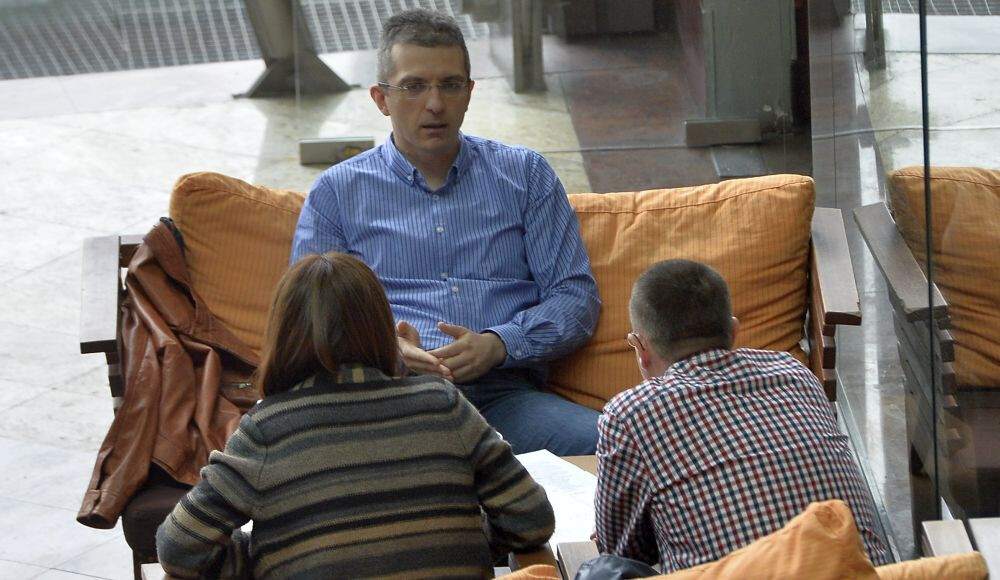
Meeting yesterday, at Băneasa Mall, with Dan Alexandru Condrea, owner of Hexi Pharma.
The man was kind enough to see us on Palm Sunday. We had spoken the previous day, we had specified a few public documents he could go through, we had told him it was important.
Condrea is a good-looking man in his 40s, who starts the discussion by saying "we want to do good, but the system is built in such a manner that you must adapt. Some things are permitted, some are off limits". We kindly ask him to explain about the system that coerces. To do what. He doesn’t go into further detail.
“Are you a doctor, Mr. Condrea?”
“Yes. And owner of healthcare companies. We also have a clinic.”
“And which is the most important value for you as the owner of a pharma company?”
“The public image is more important than money. If there’s also profit for me, that’s great. If not, it means I did something wrong. (he laughs)”
“In 2015 you had a good year.”
“Yes, the best ever, we had a turnover of about 5 million euros.”
“You provide with disinfectants 300 hospitals in Romania.”
“How did you come up with 300? Well, they are 200 all together.”
“The number is from the official company profile. It is a marketing thing.”
”... “
“(He laughs) I have a girl working in the marketing department.”
“... “
“Maybe she included the cabinets in the counting. We have been on the market for 16 years.”
“After Colectiv you signed a 600,000 euro contract with the University Hospital. Are there more orders of substances against nosocomial infections after Colectiv?”
“Yes, there are more orders. But not four times more as they say.”
“But how many times more? From simple to double?”
“For the University and Floreasca hospitals, yes, I think so. The beginning of 2016 is better than the one of 2015, you are right. You know, I was supposed to be in Colectiv.”
”I am passionate about rock. I even have a band. We were supposed to go, both me and my wife, to the concert on October 30. But something came up that day. Otherwise, our kids would have been orphans by now” - DAN ALEXANDRU CONDREA
“Along the years, were there problems with some of your substances?”
“There were problems, but we fixed them.”
“Did you take a look at the DSP 2015 report we sent you yesterday?”
“Yes, it is really badly written. It is a report full of mistakes. For instance, they wrote they had withdrawn Suprasept from the market. They never did such a thing!”
“Did you indeed withdraw certain batches from the hospitals?””
“Yes, for some of the substances. The packaging was leaking. But this is not specified in the report.”
“And what do you have to say about the Thor concentration from the DSP report?”
“I think they refer to the discrepancy between the label and the license. We changed the label.”
10
million euros is the value of the contracts signed by Hexi Pharma with the state-owned institutions according to baniitai.info, while Dan Condrea talks about a 5 million euros turnover
We show him the answer from DSP where the concentration from the label matches the one from the license.
“See, Mr. Condrea, there is a 0.25% concentration on both.”
“Yes, I don’t understand. They know all about it. But look, the Public Health Department says the product does not have concentration issues!”
“And how do DSP know THOR does not have concentration issues, do they run tests?”
“They don’t as far as I’m aware. We do the mandatory test when we get the license.”
“And where do you run lab tests?”
“At several laboratories, some in Germany, some in Romania. (He is not comfortable with the discussion, he is nervously rubbing his hands together)”
“Where do you run the majority of the tests?”
“At a laboratory in Otopeni. (He is irritated, his face has visibly turned red).”
“What’s the name of the lab?”
“Unilab. It is the cheapest and we have a good partnership.”
“Is it true you control this laboratory?”
“It is not mine.”
“I asked if you control it, not if you own it.”
He gulps. We hand him over the map of the connections between his companies, using data provided by termene.ro, collected by them from the Trade Registry.
“Please take a look at the data from the Trade Registry. Unilab is administered by the same company as your company Medical Cleaning. The administering company of both is called Emex.”
“I didn’t know that. They must keep the accounting. But how am I to control the lab, as I am not qualified to understand what is going on there? I’m just friends with the manager from Unilab, I go to visit her sometimes and we talk. Instead of paying 10,000 euros abroad for 10 tests, I pay 1,500! It is the cheapest.
“And how does it sound to you that the producer who owns a company administered by X gets the license for its products by submitting a test done precisely in the laboratory that is administered also by X?”
“Is it illegal? You know we also sponsor the hospitals where we deliver the products. Is that illegal too?”
“You also sponsored 1,000 euros in conference tickets the Microbiology and Epidemiology Association, precisely the specialists who are supposed to control your disinfectants in hospitals.”
“(He is surprised we know that) Is it illegal? You should know that it was not us who had germs in our substances. Romchim did.”
“And you have never had bacteria?”
“Yes, but we identified them after testing and we withdrew the batch.”
“What type of bacteria did you find in your products? Aggressive bacteria that kill people?
“I cannot say.”
“As you wish. We cannot force you. You are a registered company. We are talking here about the state’s control. They are compelled to answer. If there are bacteria in the substances that are expected to kill bacteria, do you see any problem there?”
“Yes, there is a problem, but we did not have anything like that in hospitals. We had in the factory but we identified them.”
“Have you ever found out you had concentration problems in your products?”
“What are you more precisely talking about?”
“Has anyone ever notified you about that?”
“I am not aware of anything of the kind.”
“If you don’t mind, we specifically asked you if any of your employees has brought to your attention problems with the concentration of the substances you are producing.”
“(He sticks with the same answer) I am not aware of anything of the kind.”
”This is a country where doctors get away with everything, there are malpractice cases that are covered up, and you come to ask us about disinfectants?” - DAN ALEXANDRU CONDREA
“Please, take a look at these two manufacturing recipes! Do they show that THOR and SUPRASEPT were produced with a concentration lower than the one stipulated in the license granted by the Ministry of Health? Are these documents authentic?”
“Where did you get those?”
“From inside your company. From a source.”
“I haven’t seen them, I don’t see the production documents. I take care of investments. I have a general manager who is in charge with the proper running of the company and a production manager who is responsible for the rest. Each person takes responsibility for their own deeds. That is what they are paid for.”
“The documents are signed by Flori Dinu, the general manager of Hexi Pharma.”
“If they are real, she may have signed without being aware what she was signing.”
“If they are real, the situation is critical, isn’t it?”
“Yes, it is. But I don’t believe they are real.”
“Isn’t this your document template?”
“It looks familiar, I think, but it has a header when we submit it for authorization.”
“Well, this document wasn’t for external use, it was used only inside your factory.”
“Yes, I get that. But I don’t think it is real. You publish it without running a double check?”
“We are double-checking it right now with you. And we will also call Flori Dinu. And we expect you to comment, to deny, to tell us your opinion. We do not establish the truth, we only publish what we find after we speak with all the involved parties.”
“And who sets the truth?”
“The Court of Law, if it’s necessary.”
“(He stares at us) And do you actually think if we delivered something like that they would still be effective?”
“That’s exactly the problem, the hospitals are overwhelmed by bacteria. Sources say that this was a common procedure in the factory.”
“Ok. Let’s assume these are real. That somebody pulled a trick. What was that person doing with the remaining active ingredient?”
“They would use it for the following batch.”
“I don’t believe it, honestly, I don’t believe it, but I am just the owner, ask Flori Dinu! Although the one in charge with the production is the production manager.”
“A source claims that you would take part in the meetings where the manufacturing recipe for the products was agreed upon.”
“Yes, but only before getting the authorization or when the recipe was modified.”
”Ask the hospital managers if our products are good. Or, if you prefer, ask the doctors. But ask many of them. And you will get the picture” - DAN ALEXANDRU CONDREA
“Is there a product the hospitals have rejected lately?”
“Yes, POLYODINE.”
“Why?”
“They say it has an irritating smell. It is used in pre-operating cleaning and, if the operating tables dry after strong light sterilization with the substance, then the irritating sensation appears. (He points at the nose). Can you give me the documents, please?”
“Yes, of course. We would like to clarify everything. That is why we met. We will be waiting for a reaction from you, whenever you want. We will also call your employee, Mrs. Dinu.”
“My employee? She is the general manager of the company.”
Dan Condrea stands up. He walks away. He absently leaves 10 lei on the table for a bottle of water he hasn’t even drunk, although the discussion lasted almost one hour and a half.
He frantically writes texts in the noisy hallway of the mall. Then he speaks on the phone for a long, long time.
He gets in his car and drives off. A car from the newspaper follows him. He stops in front of the Hexi Pharma factory in Mogoșoaia. He stays in the car with his phone glued to his ear.
WHAT DOES THE GENERAL MANAGER WHO SIGNED THE PAPERS HAVE TO SAY
“Good afternoon, Mrs. Dinu. We have just finished a conversation with your boss, Mr. Condrea.”
“And what do you want from me? I am just an employee, I don’t own the company!”
“You are the general manager. We have two documents signed by you that indicate possible irregularities in the production of two disinfecting substances. And we would like you to comment on the situation.”
“And how do you know it is my signature?”
“Well, that’s exactly what we want to ask you. We will show you the documents.”
“I cannot get out of the house. I caught an extremely bad cold.”
“We will email them to you.”
“Why should you do that? I don’t understand what you want from me. (She is irritated, she is so angry, she is almost unable to speak).
“It means we have not been clear enough. There is the possibility for certain substances to have been produced with a lower concentration than the one in the license you got from the Biocide Commission from the Ministry of Health.”
“I am not the production manager, I don’t understand what you want. Children are dying at Pitești and nobody does anything, and you are preoccupied with this!”
“No problem, you may be as malicious as you want. We do our duty to talk to you.”
“Yes, that’s me. Malicious. I’m sick, I have a cold, you can hear me speak, I cannot get out of the house! And today is also my name celebration day.”
“We understand, we said we could email them to you. Aren’t you curious to see if something like that is possible?!”
“Ok, email them to me. You know, I’m sick and tired of being threatened and blackmailed.”
“Who threatened and blackmailed you, madam?”
“A lot of people. They say I should mind my own business. That there is no room left for Romanian producers! This is the country where I get to be threatened by the vice president of the Health Insurance Authority.”
“Who are you talking about?”
“I won’t tell you. I’ve just given you a random example.”
“If…”
“(She doesn’t wait for the question) Ok, be it like that, then there will be only two-three biocide producers left on the market, as for the others, down with us!”
“Please confirm if you receive the email.”
“Allright.”
The team of Gazeta in front of the Hexi Pharma factory says the owner who got there went to buy some flowers.
Flori Dinu, the production manager Mihai Leva and a few other people arrive at the factory. And a lawyer, the husband of Flori Dinu.
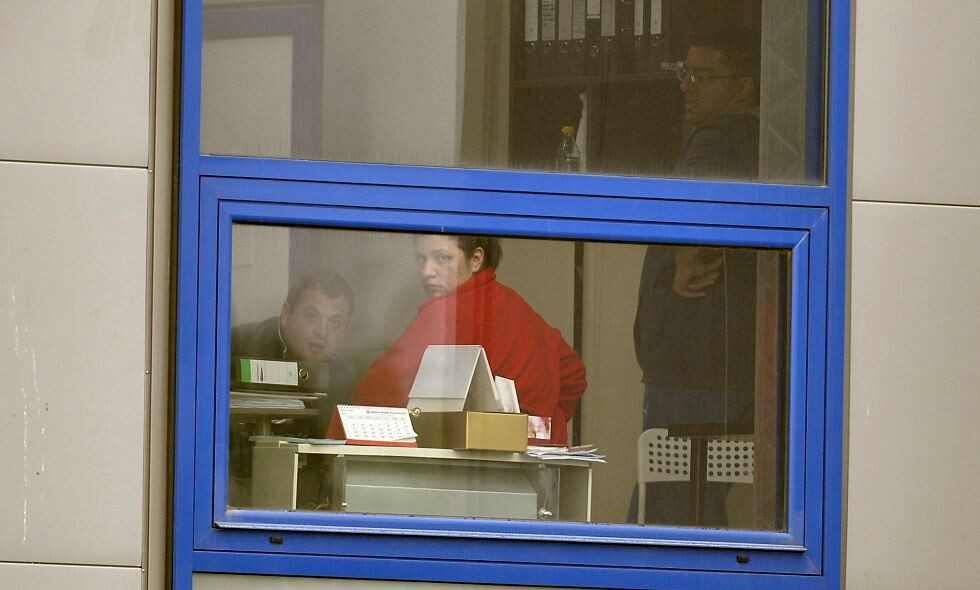
The general manager of Hexi Pharma, Flori Dinu, got back with a phone call yesterday at 05:30 PM, four hours after our first discussion. Earlier on, she was watching through the factory’s window the silhouettes traced in the rain pouring outside.
She has a totally different tone. The irony is gone. She speaks about "the internal investigation we are about to initiate on Monday morning" and about "the possibility of withdrawing the products from the market".
“Have you seen the documents?”
“Yes and I went to the factory to look for these documents. I haven’t found them but the signature seems indeed to be mine. If I signed this paper, I wasn’t aware of what I was signing.”
“How could you not be aware? You are a biochemist after all.”
“I graduated university ‘eons ago’, so to speak, and I did a master’s in management afterwards. I know as much chemistry as you do.”
“But could this really happen?”
“You signaled a problem and we will investigate it. My boss is threatening to fire me. We must clarify it. It is a very serious matter if it is real, it’s of national security importance.”
“Let’s better call it a health security matter. Don’t you remember anything?”
“I honestly don’t remember. I am a good faith person. If I did it, I really didn’t know what I was signing. I had no idea about this document. I sign 50 documents every day!”
“And you really couldn’t find the document in the archive?”
“No. But we promise tomorrow morning we will open a thorough internal investigation. We come in good faith and if this is confirmed, then we will talk with the authorities, we withdraw the products from the market, if necessary, we will find a way to fix things. We must clarify, see what happened.
Yesterday, immediately after Gazeta showed them the recipes, no matter where they were at that hour, all the managers of the company gathered in the document room above the hall where the most utilized disinfectants in Romania are produced.
After the interview with the Gazeta reporters, Dan Alexandru Condrea arrived at 01:30 PM at the Hexi Pharma production halls in Mogoşoaia.
He remained for 10 minutes in his car, a black Porsche Cayenne, and after that he entered the building. By the evening he only left for a quarter of an hour to buy flowers. Probably for his colleague Flori Dinu, who was celebrating her name day.
Dinu got to the headquarters only one hour after that, driving a red Range Rover Evoque. The manager arrived at 02:30 PM and stayed until 04:00 PM, for one hour and a half, meeting with several Hexi Pharma employees at the first floor of the building.
Condrea left the factory at 06:00 PM, four and a half hours after his arrival.
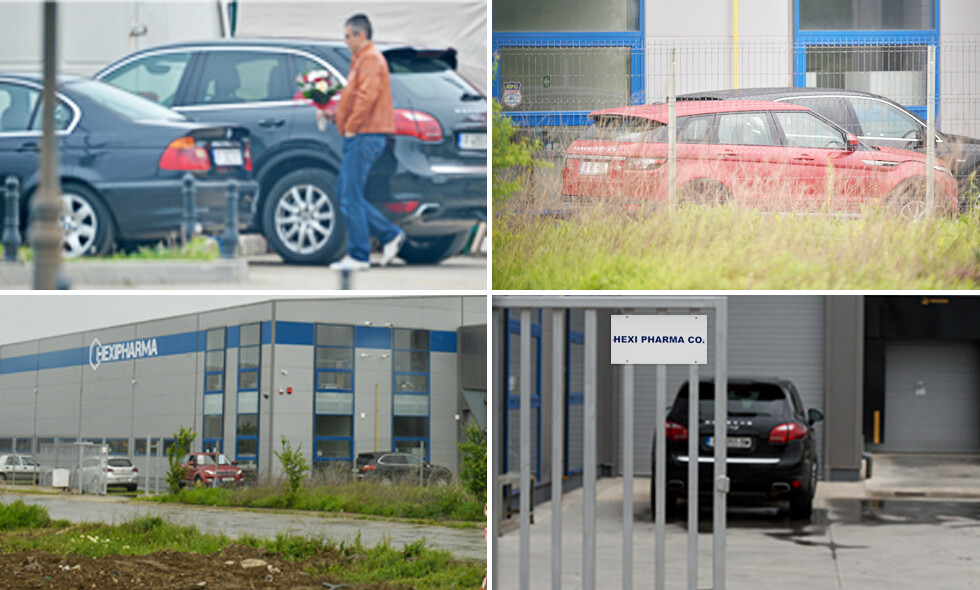
The following part of the investigation in the tomorrow’s paper:
- "We had huge deliveries during the Avian Flu! I would go myself to stick labels in the factory", says the owner of Hexi Pharma.
- "What was stated here, that the substances were diluted, was just in an undocumented article from a newspaper", claims Dan Alexandru Condrea.
- The connections between Hexi Pharma and Unilab.
- The unbelievable reaction of the Public Health department when a “non-compliant” substance of the big manufacturer was brought to their attention.
- The reaction of minister of health Cadariu-Achimaș, faced with the reality that nobody representing the state runs lab tests for disinfectants, not even for the ones that are officially found as not compliant.
RIGHT OF REPLY
Hexi Pharma, the Romanian producer of antiseptics and disinfectants, wants to answer through right to reply in the case of the article published by journalist Cătălin Tolontan regarding the efficacy of the products.
The products referred to, Thor and Suprasept, are aimed for the disinfection of surfaces and medical instruments. All the products from the Hexi Pharma portfolio are authorized by the Ministry of Health according to the law, an authorization done according to the efficacy tests included in the file, proving the efficacy of the product.
Furthermore, the products are being tested by Hexi Pharma, who has contracts with several independent laboratories, as well as by the large hospitals around the country that have microbiological control laboratories. The hospitals frequently check the efficacy of the products by collecting samples from surfaces, instruments, the hands of the medical staff, and the results indicate the efficacy according to the control procedures for nosocomial infections. The documents appearing in the article are forged, the authors have not published the originals and have not disclosed the source who provided them, and the layout of the document is one used by Hexi Pharma about 5 years ago. The manufacturing recipe has always been rigorously respected.
The defamatory article includes a reference according to which the substances Thor and Suprasept were sold in the hospitals where the victims of the Colectiv tragedy were hospitalized. We want to specify the hospitals that purchased these products during the last 12 months in the below-presented table.

Regarding the Public Health Department report for 2014 related to the THOR product, we want to specify that there is a mention related to a labeling error regarding the concentration for use of the product by spraying, and by any means not to the concentration of the substances in the product. As stipulated also in the DSP report, this problem was fixed by the correct labeling of the product.
Hexi Pharma, a Romanian manufacturer, has produced disinfectants for hospitals for 20 years and enjoys a national presence, both in state and private owned hospitals, without holding a monopoly as specified in the press article.
The contracts with the state-owned hospitals are achieved as a result of auctions through the public acquisitions system. If the products had been indeed inefficient for 20 years, the control and prevention authorities in the nosocomial infections field would have taken the necessary steps and the hospitals would have ceased to buy the products.
The article refers to the withdrawal of thousands of gallons from the market, a fact which we demand to be supported by evidence. If this statement was real, the Hexi Pharma company would have gone bankrupt and the respective hospitals would have ceased to purchase products from Hexi Pharma.
„Although we proved transparent by accepting Mr. Tolontan’s invitation, we saw that eventually the interview was truncated with the information that appeared on his blog and accompanied by malevolent comments and by drawing out of context certain statements", explains Dan Condrea, the majority shareholder of Hexi Pharma.
At the moment, we cannot evaluate the economical and public image prejudice resulting from these unsubstantiated statements and we reserve the right to address the legal court in order to be compensated.
We furthermore show our availability to provide the Ministry of Health with all necessary documents in order to support the quality of the Hexi Pharma products and to prove our innocence. We mention that we are undergoing an internal investigation, the preliminary results being the ones presented in this release.

 RO
RO








